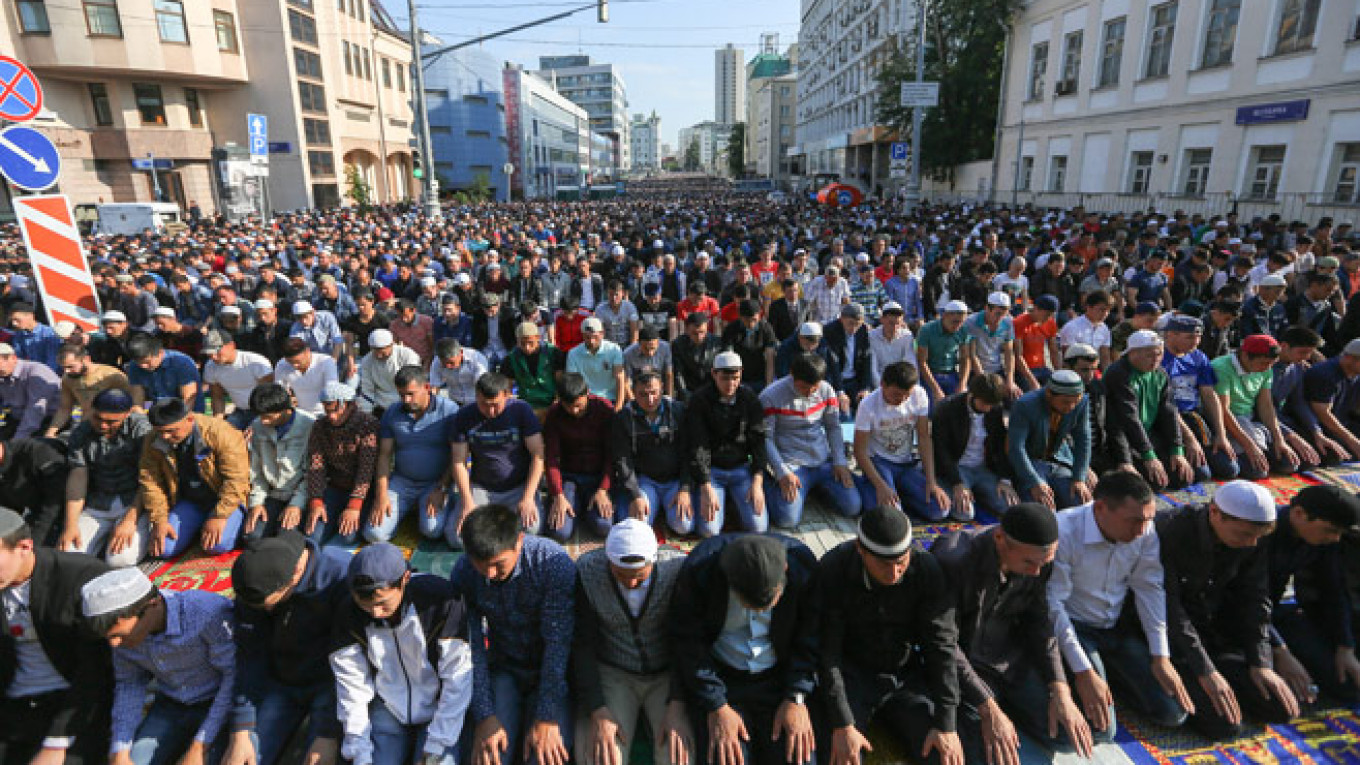One of the biggest mosques in Russia will finally open in Moscow on Wednesday after a decade of construction work, with President Vladimir Putin and foreign dignitaries attending the ceremony.
The new place of worship — built on the site of the city's original mosque — will be able to accommodate more than 10,000 people, about 10 times more than its predecessor, Rushan Abbyasov, deputy chairman of Russia's Council of Muftis, told The Moscow Times on Tuesday.
See the Photo Gallery: Putin Attends a Ceremony to Open Moscow's New Mosque
Moscow's new mosque will be on a par with two enormous mosques in Russia's North Caucasus region: the Heart of Chechnya in Grozny, and the Grand Mosque in Makhachkala, Dagestan.
Along with Putin, Turkish President Recep Erdogan and Palestine's leader Mahmoud Abbas are expected to attend the ceremony, the RIA Novosti news agency reported Tuesday.
Moscow's original mosque, built in 1904, was the only functioning Muslim place of worship during most of the Soviet era. Reconstruction work began in May 2005, but in 2011 the old building was completely demolished.
Abbyasov said that construction had cost about $170 million. Ravil Gainutdin, chairman of the Council of Muftis, told the TASS news agency on Friday that it had been funded entirely by private donations from around the world, including from Abbas, who gave $25,000. The biggest donation was made by Dagestan-born billionaire Suleiman Kerimov, who gave $100 million to the project after barely surviving a car crash in France in 2007, the Interfax news agency reported at the time.
Abbyasov said that with six floors covering a total of 19,000 square meters, the Moscow mosque will be one of the largest in Europe.
But despite its size and the installation of video screens to broadcast prayers, given that the number of Muslims living in Moscow is estimated at around 2 million people, the expansion will not solve the lack of places of worship for Muslims in the Russian capital.
There are only four mosques in the city of more than 10 million residents, and the three others can only host up to 2,000 people each, said Abbyasov, who put the number of practicing Muslims in the city — both Muscovites and migrants — at about 200,000 people.
"The opening of the mosque will only slightly improve the situation during [religious] holidays," he said. "They pray in winter, in the cold and in the rain. Believe me, it is really uncomfortable when you have to kneel in a puddle of water."
On every Muslim holiday, tens of thousands of Muslims flood the areas around Moscow's mosques, praying on roads and sidewalks and hindering access for pedestrians and motorists for hours.
Wednesday's opening ceremony is taking place just two days before the major Muslim holiday of Eid al-Adha, known in Russia as Kurban Bairam. In recent years, the festival has resulted in street closures and a heavy police presence amid protests from non-Muslim residents and Russian nationalists who complain about the city being overcrowded with Muslims.
Muslim clerics are in negotiations with the city authorities to build another large mosque capable of hosting up to 20,000 people outside the Moscow Ring Road that encircles the city, and then proceed with building smaller mosques — for up to 2,000 attendees — in every Moscow district, said Abbyasov.
Neither the Council of Muftis nor City Hall have disclosed the location for the next major mosque. Three years ago, the Moscow government officially dropped plans to build a large mosque in the city's northwest neighborhood of Mitino after thousands of local residents rallied on the streets in protest.
According to a January poll by the Levada Center think tank, 51 percent of Muscovites are against the building of new mosques in the city. Only 4 percent support the idea. Numbers for Russia overall are more balanced: 27 percent of respondents said they were against new mosques, while 30 percent saw them as a positive development. The poll was conducted among 1,600 adults and had a margin of error of 3.4 percent.
"In Russia's big cities, judgments of interethnic and inter-confessional issues are always more critical," Karina Pipiya, a sociologist at the Levada Center, told The Moscow Times.
"Moscow is a large center of domestic and international migration, society is more closely concentrated here, and as a result Muscovites are more negative and embittered."
Contact the author at [email protected]
A Message from The Moscow Times:
Dear readers,
We are facing unprecedented challenges. Russia's Prosecutor General's Office has designated The Moscow Times as an "undesirable" organization, criminalizing our work and putting our staff at risk of prosecution. This follows our earlier unjust labeling as a "foreign agent."
These actions are direct attempts to silence independent journalism in Russia. The authorities claim our work "discredits the decisions of the Russian leadership." We see things differently: we strive to provide accurate, unbiased reporting on Russia.
We, the journalists of The Moscow Times, refuse to be silenced. But to continue our work, we need your help.
Your support, no matter how small, makes a world of difference. If you can, please support us monthly starting from just $2. It's quick to set up, and every contribution makes a significant impact.
By supporting The Moscow Times, you're defending open, independent journalism in the face of repression. Thank you for standing with us.
Remind me later.






